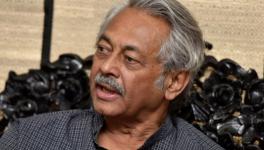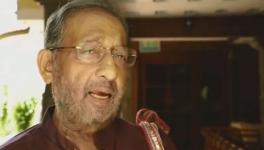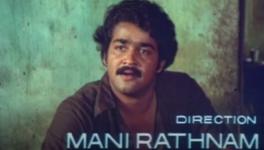KS Sethumadhavan: Shaping the Contours of Malayalam Cinema
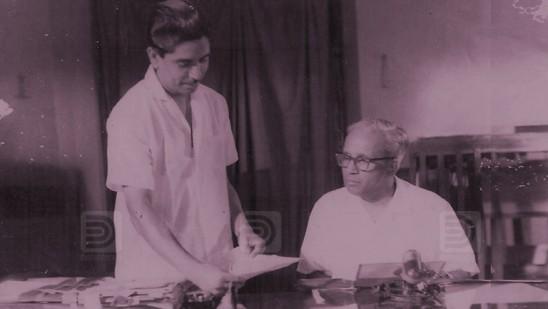
On December 24, the day legendary filmmaker KS Sethumadhavan passed away, Tamil author and playwright Indira Parthasarathy tweeted a brief account about how the National Film Development Corporation (NFDC) had funded Rs 16 lakh to Sethumadhavan in 1990 for making the film Marupakkam and upon completion of the film, the director had returned Rs 2 lakh to the body as the total cost amounted to only 14 lakh. “The only Director who has done so, the NFDC officials told me,” recollected.
The film Parthasarathy was talking about was an adaptation of his novella Ucci Veyil, the first Tamil film to win the Swarna Kamal for Best Film at the National Film Awards. Apart from recounting the director’s integrity, the account also beautifully captured what Sethumadhavan was best known for – award-winning films in multiple languages, many of them adaptations of novels and plays by acclaimed writers.
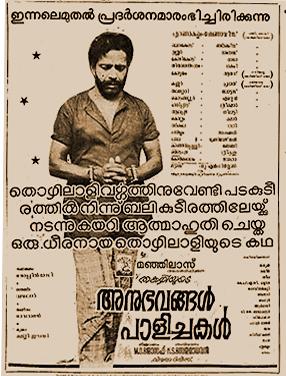
Born to Subrahmanyam and Lakshmiyamma in 1931 in Palakkad, Sethumadhavan first entered the film industry assisting director K Ramnoth in the 1951 Tamil film Marmayogi, one of the early films that enabled the rise of MG Ramachandran to superstardom.
Sethumadhavan’s first film as an independent film director was the 1960 Sinhala film Veeravijaya. Over the next three and a half decades, he helmed 69 films in six languages, most notably a number of Malayalam films starring Sathyan in the mid-60s to early 70s.
The film-maker will also be remembered for introducing a number of actors, including Kamal Haasan, Mammootty, Jagathy Sreekumar and Suresh Gopi (as a child artist) and even convincing the then Kerala Chief Minister EMS Namboodiripad for a brief appearance in the 1967 film Ollathumathi. He won a number of awards, including 10 National Film Awards and eight Kerala State Film Awards and, in 2009, the JC Daniel Award instituted by the Kerala Government to recognise contributions to Malayalam cinema.
Shaping the Contours of Popular Malayalam Cinema
The rise of the organised working class movement and the spread of education and print journalism, along with the massive popularity of the progressive literary movement, had already resulted in a conducive atmosphere for the ‘social’ to flourish in Malayalam cinema by the time Sethumadhavan started making films.
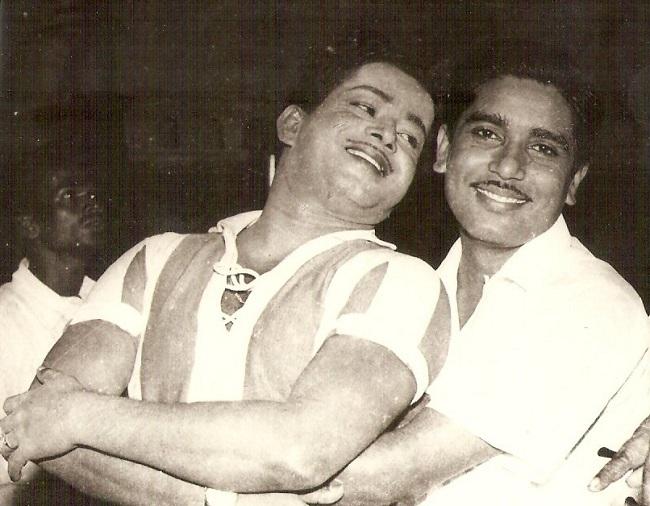
Malayalam films had distinguished themselves from films in other South Indian languages as being more reflective of contemporary social issues and concerned with ‘reality’ than with tradition and mythology. The portrayal of familial relations in these films often became a stand-in for discussing social transformation and resulting anxieties. The family melodrama is theorised as a genre that captures and reproduces the patterns of domination and exploitation in society.
Many films of that period revolved around the theme of marriage and women’s role in society, reinforcing the roles of men as providers and claimants to the secular public sphere and women as upholders of honour and chastity, largely limited to the private/domestic sphere.
Sethumadhavan’s films can be read as both a reflection of the confines and thematic concerns of popular Malayalam cinema of the period and a response to it, often pushing its boundaries and extending its scope. Although most of his works are adaptations of literary works by popular writers (including Kesavadev, Thakazhi, Uroob, Malayattoor Ramakrishnan, Muttathu Varkey, Pamman, Parappurath, Thoppil Bhasi, KT Muhammed, MT Vasudevan Nair and Padmarajan), Sethumadhavan often picked stories of male protagonists trapped in the shackles of social mores and struggling to come to terms with societal transformation. Often in his films, the ‘modern’ Malayali (man) is pictured as a being haunted by desires and obsessions and unable to uphold the same values in the domestic sphere of the patriarchal nuclear family that he fights for in the public sphere.
Memorable Films in a Prolific Career
The opening scene in Odayil Ninnu (1965), based on Kesavadev’s novel by the same name, shows Pappu, the protagonist, as a child rebelling against the discriminatory attitude of the school master. He likens the subservience that his friends show to authority, whether of the feudal landlord or the factory manager, to that of dogs. He finally finds a job that does not require him to bow before others, ironically that of a rickshaw-puller. He pulls a child out of a gutter and moves in with her mother, slogging it out for years to provide for them. The fulfillment and sense of being loved that he gets at the beginning of his role as the male provider deserts him even as he clings on to his sense of duty. The poignant final scene shows him walking into the distance, coughing heavily and out of breath, like a dog that is past its time.
Yakshi (1968) is a psychological drama, adapted from Malayattoor Ramakrishnan’s novel, in which the protagonist is a college lecturer and researcher who cannot let go of his insecurities and begins to suspect that his wife’s love is fake and she is in fact a spirit who wants to drink his blood. Suspicion, as in Vazhve Mayam (1970), and the inability to perform, as in Punarjanmam (1972), are recurring themes in Sethumadhavan’s work; as is the Oedipal struggle.
In the 1971 film Anubhavangal Palichakal, based on Thakazhi Sivashankara Pillai’s novel and scripted by Thoppil Bhasi, the opening credits play over visuals of workers and agricultural labourers accompanied by the famous song SarvarajyaThozhilalikal, calling workers of all nations to organise and gain strength. Released following the wake of other films portraying working class anti-feudal movements like Punnapra Vayalar (1968) and Ningalenne Communistakki (1970) and along with Sethumadhavan’s own Inqulab Zindabbad, the film is set in the backdrop of political mobiliasation of agricultural labourers and the implementation of land reforms initiated by the communists.
Sathyan plays the role of Chellappan, a commited communist who, when forced to go underground, learns that his wife, whom he had neglected and suspected of infidelity, has begun a relationship with a fellow labourer. Betrayed by the patriarchal family value system and disillusioned about the liberation promised by the communist movement, he ends up deciding to murder a factory owner and court arrest, fully knowing that he would be hanged for the act. The song Pravachakanmare Parayoo mournfully declares the crumbling of his beliefs. Sethumadhavan had to hurry to finish the film as it was shot when Sathyan’s condition due to leukaemia was worsening; a body double was used for parts of the last sequence after Sathyan’s demise.
In Oppol (1981), an adaptation of MT Vasudevan Nair’s short story by the same name, the lonely and claustrophobic life of the unwed mother as a result of societal attitudes is mirrored in the sorrowful remains of the village tharavadu. The man she is ‘married off’ to is forced to come to terms with whether his claims of not caring about her chastity are sincere.
Sethumadhavan’s last film in Malayalam, Venal Kinavukal (1991), was also scripted by MT Vasudevan Nair. The film is a deeply pessimistic portrayal of social crisis in the wake of neoliberalisation and the opening up of the market, playing on anxieties over adolescent sexual awakening. Importantly, one can also notice that the championing of social justice that played in and around the narratives of many of his earlier films are absent in these later ones - replaced by a commentary on the corrupting influence of money.
50 Years Since the Thalassery Riots
Sethumadhavan’s 1972 film Achanum Bappayum, written by KT Muhammed, was released just months after the communal riots in Thalassery in December-January and went on to claim the Nargis Dutt Award for Best Feature Film on National Integration at the National Film Awards.
The film tells the story of a Hindu man whose obsession shifts from taking revenge for his wife’s infidelity to raising an abandoned girl, born out of wedlock from Muslim parents, as a Muslim in his household. Though it would be considered regressive now in terms of its reinforcement of gender roles, the film exposes the underlying religious fault lines beneath the surface of a modern, secular Malayali society. Fifty years on since the Thalassery riots, the Rashtriya Swayamsevak Sangh (RSS) has renewed efforts to raise communal tensions in Kerala as it did all those years ago.
As the lyrics of the famous song from Achanum Bappayum titled Manushyan Mathangale Srishtichu goes: Manushyan theruvil marikkunnu/Mathangal chirikkunnu (Humans are dying in the streets/Religions are laughing). Incidentally, this song was also the one which bagged the first out of eight National Awards for Best Male Playback Singer for KJ Yesudas. The thematic concerns embodied in the works of Sethumadhavan are still relevant today.
Get the latest reports & analysis with people's perspective on Protests, movements & deep analytical videos, discussions of the current affairs in your Telegram app. Subscribe to NewsClick's Telegram channel & get Real-Time updates on stories, as they get published on our website.











